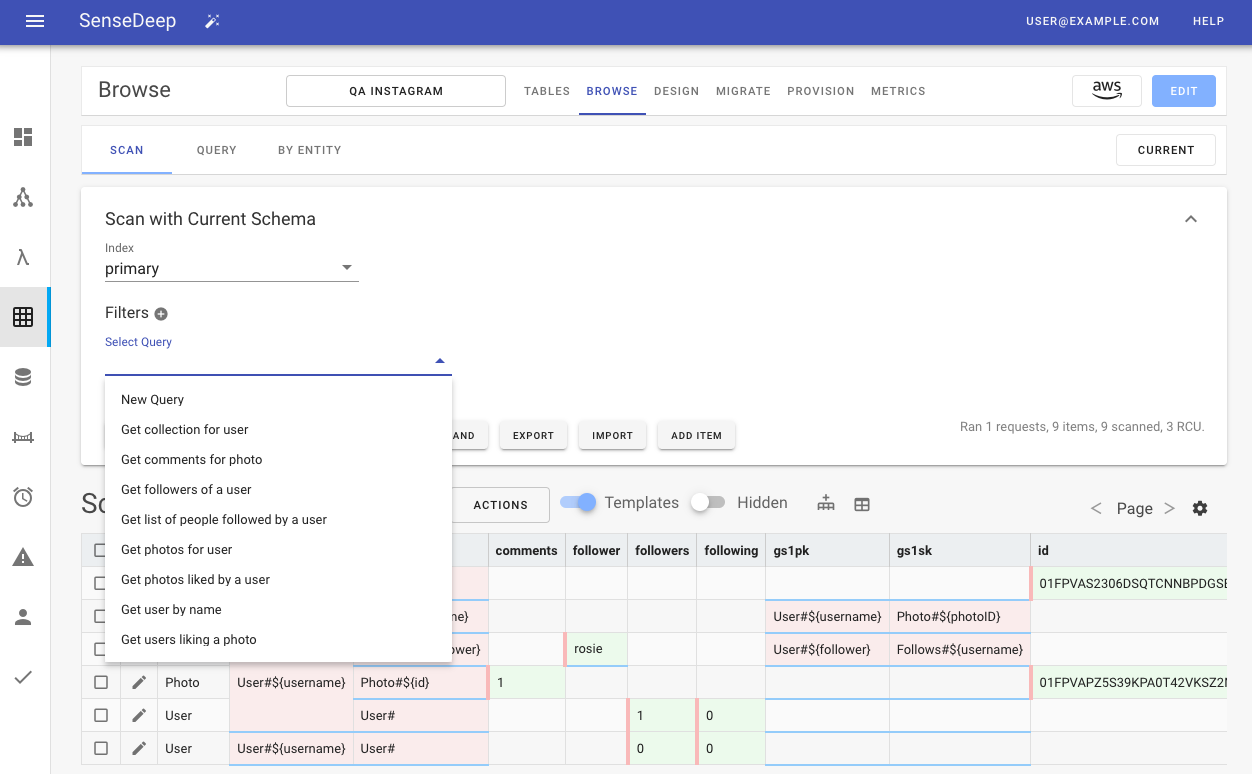
Security News
38% of CISOs Fear They’re Not Moving Fast Enough on AI
CISOs are racing to adopt AI for cybersecurity, but hurdles in budgets and governance may leave some falling behind in the fight against cyber threats.
dynamodb-onetable
Advanced tools

One Table to Rule Them All
OneTable is the most evolved API for DynamoDB. It provides a dry, high-level, elegant syntax while enabling full access to the DynamoDB API.
OneTable works with JavaScript and TypeScript. For TypeScript, OneTable will create fully typed entities from your data schemas automatically.
npm i dynamodb-onetable
Import the OneTable library. If you are not using ES modules or TypeScript, use require to import the libraries.
import {Table} from 'dynamodb-onetable'
Import the DynamoDBClient class and create a DynamoDBClient instance.
import {DynamoDBClient} from '@aws-sdk/client-dynamodb'
const client = new DynamoDBClient({
endpoint: `http://localhost:${PORT}`,
region: 'local',
credentials: new AWS.Credentials({
accessKeyId: 'test',
secretAccessKey: 'test',
}),
})
If you are using the legacy AWS SDK V2, import the AWS DynamoDB class and create a DocumentClient instance.
import DynamoDB from 'aws-sdk/clients/dynamodb'
const client = new DynamoDB.DocumentClient(params)
Note: you can use the Table.setClient API to defer setting the client or replace the client at any time.
Initialize your OneTable Table instance and define your models via a schema.
const table = new Table({
client: client,
name: 'MyTable',
schema: MySchema,
})
This will initialize your OneTable Table instance and define your models via a schema.
Schemas define how items will be stored in your database and look like this:
const MySchema = {
format: 'onetable:1.1.0',
version: '0.0.1',
indexes: {
primary: {hash: 'pk', sort: 'sk'},
gs1: {hash: 'gs1pk', sort: 'gs1sk', follow: true},
ls1: {sort: 'id', type: 'local'},
},
models: {
Account: {
pk: {type: String, value: 'account:${id}'},
sk: {type: String, value: 'account:'},
id: {type: String, generate: 'ulid', validate: /^[0123456789ABCDEFGHJKMNPQRSTVWXYZ]{26}$/i},
name: {type: String, required: true},
status: {type: String, default: 'active'},
zip: {type: String},
},
User: {
pk: {type: String, value: 'account:${accountName}'},
sk: {type: String, value: 'user:${email}', validate: EmailRegExp},
id: {type: String, required: true},
accountName: {type: String, required: true},
email: {type: String, required: true},
firstName: {type: String, required: true},
lastName: {type: String, required: true},
username: {type: String, required: true},
role: {type: String, enum: ['user', 'admin'], required: true, default: 'user'},
balance: {type: Number, default: 0},
gs1pk: {type: String, value: 'user-email:${email}'},
gs1sk: {type: String, value: 'user:'},
},
},
params: {
isoDates: true,
timestamps: true,
},
}
To create an item:
let account = await Account.create({
id: '8e7bbe6a-4afc-4117-9218-67081afc935b',
name: 'Acme Airplanes',
})
This will write the following to DynamoDB:
{
pk: 'account:8e7bbe6a-4afc-4117-9218-67081afc935b',
sk: 'account:98034',
id: '8e7bbe6a-4afc-4117-9218-67081afc935b',
name: 'Acme Airplanes',
status: 'active',
zip: '98034',
created: 1610347305510,
updated: 1610347305510,
}
Get an item:
let account = await Account.get({
id: '8e7bbe6a-4afc-4117-9218-67081afc935b',
})
which will return:
{
id: '8e7bbe6a-4afc-4117-9218-67081afc935b',
name: 'Acme Airplanes',
status: 'active',
zip: '98034',
}
To use a secondary index:
let user = await User.get({email: 'user@example.com'}, {index: 'gs1'})
To find a set of items:
let users = await User.find({accountId: account.id})
let adminUsers = await User.find({accountId: account.id, role: 'admin'})
let users = await User.find(
{accountId: account.id},
{
where: '${balance} > {100.00}',
}
)
// Get a count of matching users without returning the actual items
let users = await User.find({accountId: account.id, role: 'admin'}, {count: true})
let count = users.count
To update an item:
await User.update({id: userId, balance: 50})
await User.update({id: userId}, {add: {balance: 10.0}})
await User.update({id: userId}, {set: {status: '{active}'}})
To do a transactional update:
let transaction = {}
await Account.update({id: account.id, status: 'active'}, {transaction})
await User.update({id: user.id, role: 'user'}, {transaction})
await table.transact('write', transaction)
OneTable provides TypeScript type declaration files so that OneTable APIs, requests and responses can be fully type checked.
OneTable also creates type declarations for your table entities and attributes. TypeScript will catch any invalid entity or entity attribute references.
Using the magic of TypeScript dynamic typing, OneTable automatically converts your OneTable schema into fully typed generic Model APIs.
For example:
import {Entity, Model, Table} from 'dynamodb-onetable'
const MySchema = {
...
models: {
Account: {
pk: { type: String, value: 'account:${name}' },
name: { type: String },
}
} as const // Required for TypeScript
}
// Fully typed Account object based on the schema
type Account = Entity<typeof MySchema.models.Account>
let account: Account = {
name: 'Coyote', // OK
unknown: 42, // Error
}
let AccountModel: Model<Account> = table.getModel('Account')
let account = await AccountModel.create({
name: 'Acme', // OK
unknown: 42, // Error
})
account.name = 'Coyote' // OK
account.unknown = 42 // Error
Here is a collection of articles that can help you on your way with DynamoDB and OneTable.
And a few serverless articles:
| Serverless Topic | Link |
|---|---|
| How to Debug Serverless Apps | https://www.sensedeep.com/blog/posts/stories/how-to-debug-serverless-apps.html |
| How to invoke HTTP without Waiting from Lambda | https://www.sensedeep.com/blog/posts/stories/lambda-fast-http.html |
| Fast Logging with Lambda | https://www.sensedeep.com/blog/posts/senselogs/serverless-logging.html |
Please try our SenseDeep Serverless Developer Studio that includes a full DynamoDB suite with single-table aware data browser, single-table designer, migration manager, provisioning planner and metrics.
 .
.
FAQs
DynamoDB access library for single-table designs
We found that dynamodb-onetable demonstrated a healthy version release cadence and project activity because the last version was released less than a year ago. It has 0 open source maintainers collaborating on the project.
Did you know?

Socket for GitHub automatically highlights issues in each pull request and monitors the health of all your open source dependencies. Discover the contents of your packages and block harmful activity before you install or update your dependencies.

Security News
CISOs are racing to adopt AI for cybersecurity, but hurdles in budgets and governance may leave some falling behind in the fight against cyber threats.

Research
Security News
Socket researchers uncovered a backdoored typosquat of BoltDB in the Go ecosystem, exploiting Go Module Proxy caching to persist undetected for years.

Security News
Company News
Socket is joining TC54 to help develop standards for software supply chain security, contributing to the evolution of SBOMs, CycloneDX, and Package URL specifications.